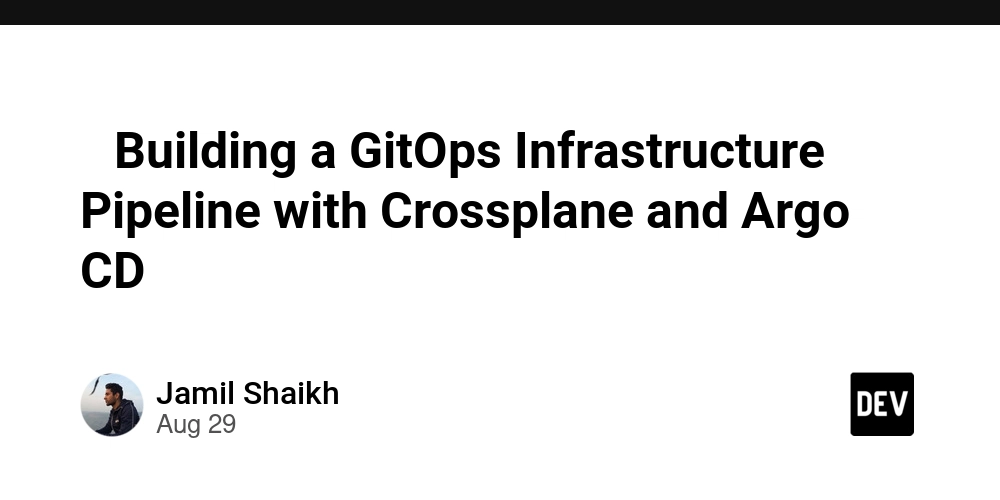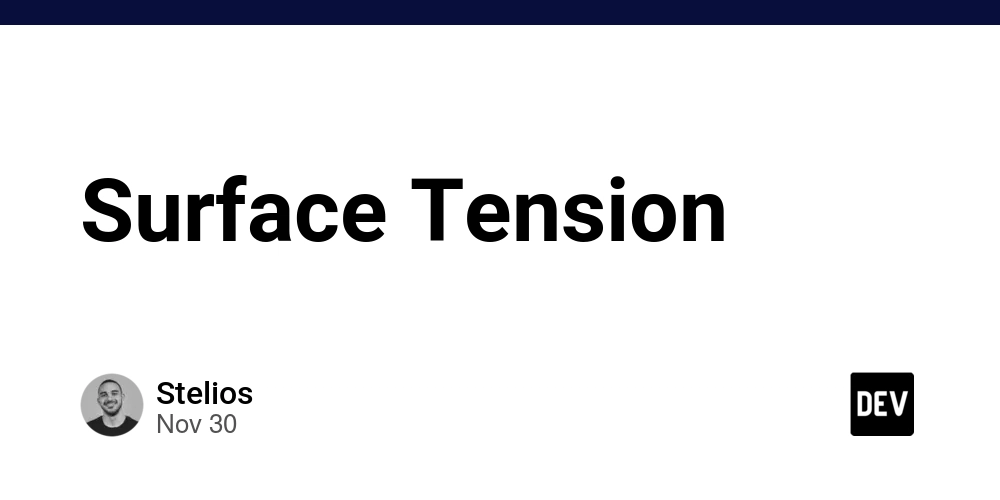From manual kubectl commands to fully automated infrastructure management – here’s how I built a production-ready GitOps pipeline
TL;DR
I built a complete GitOps infrastructure management system using:
- 🎯 Argo CD for GitOps automation
- ⚡ Crossplane for infrastructure provisioning
- 🔄 App-of-Apps pattern for scalable application management
- 📦 MetalLB as the infrastructure example
- 🎭 Sync waves for dependency management
Result: Infrastructure changes now happen through Git commits, with full automation and zero manual intervention.
The Problem I Solved
Managing Kubernetes infrastructure traditionally sucks:
# The old way - manual and error-prone
kubectl apply -f metallb-config.yaml
kubectl apply -f ingress-controller.yaml
kubectl apply -f monitoring-stack.yaml
# Oh no! Order matters... 💥
# Which version is running in production? 🤷♂️
# Who made that change? 🕵️♂️
I wanted infrastructure that:
- ✅ Lives in Git (version controlled)
- ✅ Deploys automatically (no manual steps)
- ✅ Handles dependencies (no ordering issues)
- ✅ Self-heals (drift detection & correction)
- ✅ Provides audit trails (who, what, when)
The Solution Architecture
graph LR
A[Git Commit] --> B[Argo CD]
B --> C[Crossplane]
C --> D[Kubernetes Resources]
B --> E[Sync Waves]
E --> F[Ordered Deployment]
🎯 Step 1: App-of-Apps Pattern
Instead of managing 50+ individual Argo CD applications, I use the App-of-Apps pattern:
# One app to rule them all
apiVersion: argoproj.io/v1alpha1
kind: Application
metadata:
name: homelab-root
annotations:
argocd.argoproj.io/sync-wave: "-1"
spec:
source:
repoURL: https://github.com/jamilshaikh07/homelab-gitops.git
path: apps # 👈 All child apps live here
syncPolicy:
automated:
prune: true # 🗑️ Clean up deleted resources
selfHeal: true # 🔧 Fix manual changes
Benefits:
- One root app manages everything
- New apps = just add YAML files
- Automatic discovery and deployment
⚡ Step 2: Crossplane for Infrastructure
Crossplane lets me manage infrastructure through Kubernetes APIs. Here’s the magic:
# Instead of direct kubectl apply...
apiVersion: kubernetes.crossplane.io/v1alpha1
kind: Object
metadata:
name: metallb-ipaddresspool
annotations:
argocd.argoproj.io/sync-wave: "2" # 👈 Depends on provider
spec:
providerConfigRef:
name: in-cluster
forProvider:
manifest:
apiVersion: metallb.io/v1beta1
kind: IPAddressPool
metadata:
name: homelab-pool
namespace: metallb-system
spec:
addresses:
- 10.20.0.81-10.20.0.99 # 🎯 My LoadBalancer IP range
Why Crossplane Objects?
- 🔄 Continuous reconciliation (drift detection)
- 📊 Rich status reporting (health, errors)
- 🎭 Dependency management (waits for providers)
- 🔒 RBAC integration (secure access)
🎭 Step 3: Sync Waves for Dependencies
Order matters in infrastructure! I use sync waves to ensure proper sequencing:
# Wave -1: Root app-of-apps
argocd.argoproj.io/sync-wave: "-1"
# Wave 0: Install Crossplane providers
argocd.argoproj.io/sync-wave: "0"
# Wave 1: Provider configs + RBAC
argocd.argoproj.io/sync-wave: "1"
# Wave 2: Infrastructure resources
argocd.argoproj.io/sync-wave: "2"
Result: No more “CRD not found” or “provider not ready” errors! 🎉
🔐 Step 4: RBAC – The Critical Missing Piece
Crossplane needs permissions to manage your infrastructure. This is often overlooked:
apiVersion: rbac.authorization.k8s.io/v1
kind: ClusterRole
metadata:
name: crossplane-provider-kubernetes-metallb
rules:
- apiGroups: ["metallb.io"]
resources: ["ipaddresspools", "l2advertisements"]
verbs: ["*"]
---
# Bind to the provider's service account
apiVersion: rbac.authorization.k8s.io/v1
kind: ClusterRoleBinding
metadata:
name: crossplane-provider-kubernetes-metallb
roleRef:
kind: ClusterRole
name: crossplane-provider-kubernetes-metallb
subjects:
- kind: ServiceAccount
name: provider-kubernetes-xxxxx # 👈 Get from kubectl
namespace: crossplane-system
Pro tip: Restart provider pods after RBAC changes!
🧪 Testing the Complete Pipeline
Time for the moment of truth:
# 1. Bootstrap (one-time manual step)
kubectl apply -f argocd/app-of-apps.yaml
# 2. Check GitOps automation
kubectl -n argocd get applications
NAME SYNC STATUS HEALTH STATUS
crossplane-provider-kubernetes Synced Healthy ✅
homelab-root Synced Healthy ✅
metallb-config Synced Healthy ✅
# 3. Verify infrastructure was created
kubectl -n metallb-system get ipaddresspools.metallb.io
NAME ADDRESSES
homelab-pool ["10.20.0.81-10.20.0.99"] ✅
# 4. Test LoadBalancer functionality
kubectl create deployment nginx --image=nginx
kubectl expose deployment nginx --type=LoadBalancer --port=80
kubectl get svc nginx
NAME TYPE EXTERNAL-IP PORT(S)
nginx LoadBalancer 10.20.0.82 80:30114/TCP ✅
# 5. Verify connectivity
curl http://10.20.0.82
<!DOCTYPE html>
<head>Welcome to nginx!
# 🎉 SUCCESS!
It works! Infrastructure deployed entirely through GitOps! 🚀
📁 Repository Structure
homelab-gitops/
├── argocd/
│ └── app-of-apps.yaml # 🏠 Root application
├── apps/
│ ├── crossplane-provider-kubernetes-app.yaml
│ └── metallb-config-app.yaml # 👶 Child applications
├── crossplane/
│ └── provider-kubernetes/
│ ├── provider.yaml # ⚡ Crossplane provider
│ ├── providerconfig.yaml # ⚙️ Configuration
│ └── rbac.yaml # 🔐 Permissions
└── metallb/
├── metallb-ipaddresspool.yaml # 🌐 Infrastructure
└── metallb-l2advertisement.yaml # 📦 Resources
💡 Key Lessons Learned
1. API Versions Are Critical
Different provider versions use different APIs:
# v0.13.0 uses v1alpha1
apiVersion: kubernetes.crossplane.io/v1alpha1
# Newer versions use v1alpha2
apiVersion: kubernetes.crossplane.io/v1alpha2
2. Bootstrap is Still Manual
Even with full GitOps, you need one manual step:
kubectl apply -f argocd/app-of-apps.yaml
After this, everything else is automated!
3. RBAC Debugging
If Crossplane objects stay “NotReady”:
# Check provider permissions
kubectl -n crossplane-system describe object metallb-ipaddresspool
# Common fix: restart provider after RBAC changes
kubectl -n crossplane-system delete pod -l pkg.crossplane.io/provider=provider-kubernetes
4. YAML Formatting Matters
Watch your indentation! This kept my root app OutOfSync:
# ❌ Wrong
destination:
server: https://kubernetes.default.svc
namespace: crossplane-system
# ✅ Correct
destination:
server: https://kubernetes.default.svc
namespace: crossplane-system
🚀 What’s Next?
This foundation scales to manage ANY infrastructure:
# Database clusters
kind: PostgreSQLCluster
# Service meshes
kind: Istio
# Monitoring stacks
kind: PrometheusStack
# Certificate management
kind: ClusterIssuer
# Storage solutions
kind: StorageClass
The pattern stays the same:
- Define in YAML
- Commit to Git
- Argo CD syncs automatically
- Crossplane provisions infrastructure
- Profit! 💰
🎉 Results
Before:
- Manual
kubectlcommands - Configuration drift
- No audit trail
- Deployment anxiety 😰
After:
- Infrastructure as Code
- Git-driven deployments
- Automatic drift correction
- Pull request reviews
- Confidence in production 😎
Infrastructure changes are now as simple as creating a pull request!
🔗 Resources
What infrastructure will you GitOps next? Drop a comment and let me know what you’re planning to automate! 👇
Follow me for more cloud-native and DevOps content! 🚀



